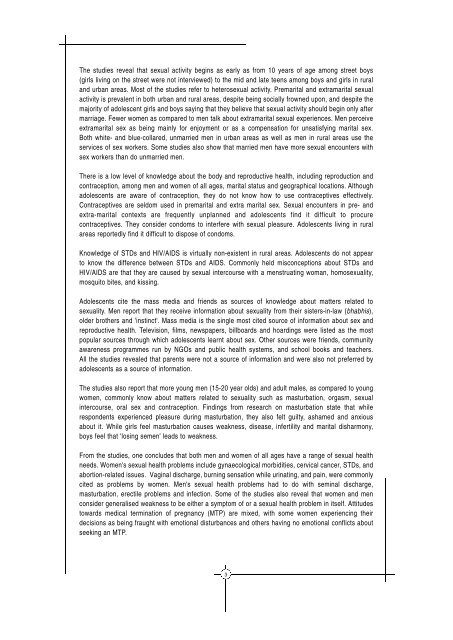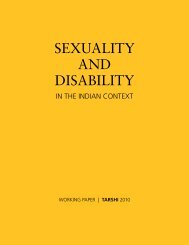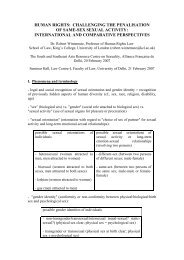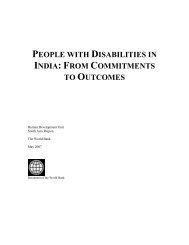FREE Download - TARSHI
FREE Download - TARSHI
FREE Download - TARSHI
Create successful ePaper yourself
Turn your PDF publications into a flip-book with our unique Google optimized e-Paper software.
The studies reveal that sexual activity begins as early as from 10 years of age among street boys<br />
(girls living on the street were not interviewed) to the mid and late teens among boys and girls in rural<br />
and urban areas. Most of the studies refer to heterosexual activity. Premarital and extramarital sexual<br />
activity is prevalent in both urban and rural areas, despite being socially frowned upon, and despite the<br />
majority of adolescent girls and boys saying that they believe that sexual activity should begin only after<br />
marriage. Fewer women as compared to men talk about extramarital sexual experiences. Men perceive<br />
extramarital sex as being mainly for enjoyment or as a compensation for unsatisfying marital sex.<br />
Both white- and blue-collared, unmarried men in urban areas as well as men in rural areas use the<br />
services of sex workers. Some studies also show that married men have more sexual encounters with<br />
sex workers than do unmarried men.<br />
There is a low level of knowledge about the body and reproductive health, including reproduction and<br />
contraception, among men and women of all ages, marital status and geographical locations. Although<br />
adolescents are aware of contraception, they do not know how to use contraceptives effectively.<br />
Contraceptives are seldom used in premarital and extra marital sex. Sexual encounters in pre- and<br />
extra-marital contexts are frequently unplanned and adolescents find it difficult to procure<br />
contraceptives. They consider condoms to interfere with sexual pleasure. Adolescents living in rural<br />
areas reportedly find it difficult to dispose of condoms.<br />
Knowledge of STDs and HIV/AIDS is virtually non-existent in rural areas. Adolescents do not appear<br />
to know the difference between STDs and AIDS. Commonly held misconceptions about STDs and<br />
HIV/AIDS are that they are caused by sexual intercourse with a menstruating woman, homosexuality,<br />
mosquito bites, and kissing.<br />
Adolescents cite the mass media and friends as sources of knowledge about matters related to<br />
sexuality. Men report that they receive information about sexuality from their sisters-in-law (bhabhis),<br />
older brothers and 'instinct'. Mass media is the single most cited source of information about sex and<br />
reproductive health. Television, films, newspapers, billboards and hoardings were listed as the most<br />
popular sources through which adolescents learnt about sex. Other sources were friends, community<br />
awareness programmes run by NGOs and public health systems, and school books and teachers.<br />
All the studies revealed that parents were not a source of information and were also not preferred by<br />
adolescents as a source of information.<br />
The studies also report that more young men (15-20 year olds) and adult males, as compared to young<br />
women, commonly know about matters related to sexuality such as masturbation, orgasm, sexual<br />
intercourse, oral sex and contraception. Findings from research on masturbation state that while<br />
respondents experienced pleasure during masturbation, they also felt guilty, ashamed and anxious<br />
about it. While girls feel masturbation causes weakness, disease, infertility and marital disharmony,<br />
boys feel that 'losing semen' leads to weakness.<br />
From the studies, one concludes that both men and women of all ages have a range of sexual health<br />
needs. Women's sexual health problems include gynaecological morbidities, cervical cancer, STDs, and<br />
abortion-related issues. Vaginal discharge, burning sensation while urinating, and pain, were commonly<br />
cited as problems by women. Men's sexual health problems had to do with seminal discharge,<br />
masturbation, erectile problems and infection. Some of the studies also reveal that women and men<br />
consider generalised weakness to be either a symptom of or a sexual health problem in itself. Attitudes<br />
towards medical termination of pregnancy (MTP) are mixed, with some women experiencing their<br />
decisions as being fraught with emotional disturbances and others having no emotional conflicts about<br />
seeking an MTP.<br />
3










